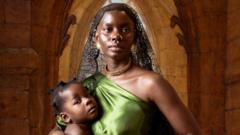Dola Posh’s poignant self-portraits reveal her struggles with postnatal depression and the search for identity in motherhood.
### A Mother’s Lens: Dola Posh’s Artistic Journey Through Postnatal Depression

### A Mother’s Lens: Dola Posh’s Artistic Journey Through Postnatal Depression
A photographer captures her battle with identity and mental health after childbirth amidst a pandemic.
---
Dola Posh embodies multiple roles: she is a photographer, a Nigerian woman, a mother, and a Briton. However, after giving birth during the Covid-19 lockdown, she grappled with her sense of self, feeling lost in the whirlwind of changes in her life. Just six days post-delivery, she found herself confined to a hospital bed, reflecting on the significance of her new role and worrying whether she could return to her passion for photography.
Being physically distanced from her family, particularly her mother who resided thousands of miles away in Lagos, deepened Dola’s feelings of isolation and pressure. The conflicting emotions led her to a dark place where she doubted her identity: "I thought: ‘I’m me; the baby’s out, I’m still me.’ But no, I wasn’t me any more." At this moment, she unknowingly faced the onset of postnatal depression – a mental health condition notably affecting black women more severely.
Upon leaving the hospital, Dola was met with an avalanche of unsolicited parenting advice, which intensified her feelings of inadequacy. "There was too much talk... It made me feel like I didn’t know what I was doing," she recalls. The struggle compounded as sleeplessness and isolation loomed large and led her to a devastating mental low.
Despite her despair, a pivotal night came when she reached out to her health visitor, who supported her in seeking therapy. This professional encouragement steered Dola back to her artistic roots—photography became her healing outlet. Using her phone to control the camera remotely, she began capturing a series of self-portraits with her daughter Monioluwa.
Initially drawing on Western artistic motifs of the Madonna and child, Dola’s work deceptively reflected her upbringing in a religious household where such imagery was commonplace. She utilized her experiences and cultural background to contextualize her struggles within her art, allowing her to express the complexities of motherhood amidst mental health battles.
As her photography journey unfolded, she integrated cultural elements, such as the veil she associated with nurturing and family. Through this artistic exploration, Dola found her sense of self returning, realizing that her achievements did not negate her experiences.
By sharing her story and articulating the realities of motherhood, she aimed to dismantle the stigma surrounding postnatal depression. "Now I am starting to work on the stories... and try to depict that through images," she states confidently. Recently, Dola received recognition from camera manufacturer Leica to fund her ongoing series, addressing mental health and representation for black mothers in the media.
"Women shouldn’t have to bear the weight of these experiences alone," Dola emphasizes, advocating for more openness in conversations about mental health. Her resolve to portray her truth exemplifies the significance of vulnerability and community in healing.
For those grappling with similar experiences, resources from the NHS and mental health organizations stand ready to provide support. Dola Posh’s journey reflects not only the struggles of motherhood but also the power of art as a medium for resilience and connection.
Dola Posh embodies multiple roles: she is a photographer, a Nigerian woman, a mother, and a Briton. However, after giving birth during the Covid-19 lockdown, she grappled with her sense of self, feeling lost in the whirlwind of changes in her life. Just six days post-delivery, she found herself confined to a hospital bed, reflecting on the significance of her new role and worrying whether she could return to her passion for photography.
Being physically distanced from her family, particularly her mother who resided thousands of miles away in Lagos, deepened Dola’s feelings of isolation and pressure. The conflicting emotions led her to a dark place where she doubted her identity: "I thought: ‘I’m me; the baby’s out, I’m still me.’ But no, I wasn’t me any more." At this moment, she unknowingly faced the onset of postnatal depression – a mental health condition notably affecting black women more severely.
Upon leaving the hospital, Dola was met with an avalanche of unsolicited parenting advice, which intensified her feelings of inadequacy. "There was too much talk... It made me feel like I didn’t know what I was doing," she recalls. The struggle compounded as sleeplessness and isolation loomed large and led her to a devastating mental low.
Despite her despair, a pivotal night came when she reached out to her health visitor, who supported her in seeking therapy. This professional encouragement steered Dola back to her artistic roots—photography became her healing outlet. Using her phone to control the camera remotely, she began capturing a series of self-portraits with her daughter Monioluwa.
Initially drawing on Western artistic motifs of the Madonna and child, Dola’s work deceptively reflected her upbringing in a religious household where such imagery was commonplace. She utilized her experiences and cultural background to contextualize her struggles within her art, allowing her to express the complexities of motherhood amidst mental health battles.
As her photography journey unfolded, she integrated cultural elements, such as the veil she associated with nurturing and family. Through this artistic exploration, Dola found her sense of self returning, realizing that her achievements did not negate her experiences.
By sharing her story and articulating the realities of motherhood, she aimed to dismantle the stigma surrounding postnatal depression. "Now I am starting to work on the stories... and try to depict that through images," she states confidently. Recently, Dola received recognition from camera manufacturer Leica to fund her ongoing series, addressing mental health and representation for black mothers in the media.
"Women shouldn’t have to bear the weight of these experiences alone," Dola emphasizes, advocating for more openness in conversations about mental health. Her resolve to portray her truth exemplifies the significance of vulnerability and community in healing.
For those grappling with similar experiences, resources from the NHS and mental health organizations stand ready to provide support. Dola Posh’s journey reflects not only the struggles of motherhood but also the power of art as a medium for resilience and connection.





















